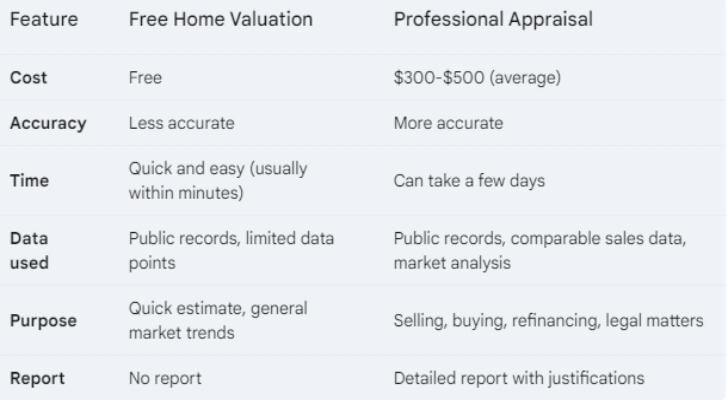Free Home Valuation vs. Professional Appraisal: Key Differences

Understanding the value of your home is crucial for various reasons, such as selling it, refinancing your mortgage, or simply tracking your net worth. There are two main ways to estimate your home's value: free home valuations and professional appraisals. While both methods provide an estimate, there are significant differences between them.
What is a Free Home Valuation?
A free home valuation is a quick and easy way to get a ballpark estimate of your home's value. These valuations are typically conducted online or through real estate agents.
• Online tools: Several websites offer free home valuation tools. These tools use public records, recent sales data in your area, and basic property information (square footage, number of bedrooms/bathrooms) to generate an estimate.
• Real estate agent estimates: Real estate agents can also provide a free home valuation based on their experience and knowledge of the local market.
While convenient, free valuations have limitations:
• Accuracy: Free valuations are often less accurate than professional appraisals. They may not account for factors like your home's unique features, condition, or recent renovations.
• Limited data: Online tools rely on publicly available data, which might be incomplete or outdated.
What is a Professional Appraisal?
A professional appraisal is a more detailed and thorough assessment of your home's value conducted by a licensed appraiser. The appraiser will visit your home, inspect it thoroughly, research comparable properties in your neighborhood that have recently sold, and analyze market trends. This information is then used to create a comprehensive report that details the estimated value of your home.
Here are some advantages of professional appraisals:
• Accuracy: Professional appraisals are generally considered more accurate than free valuations. The appraiser's expertise and in-depth analysis provide a more reliable estimate.
• Detailed report: The appraisal report provides a breakdown of the factors considered in determining the value, including comparable sales data, adjustments for property condition, and market analysis. This report can be valuable for various purposes, such as negotiating a sale price or securing a loan.
• Legal weight: A professional appraisal may be required by lenders when you refinance your mortgage or by courts in legal disputes.
Key Differences Between Free Valuations and Appraisals
By understanding the differences between free home valuations and professional appraisals, you can make informed decisions about your homeownership and financial planning.

Example: Imagine you are thinking about selling your house. You haven't done any major renovations in recent years, but you've noticed that similar houses in your neighborhood have been selling for more than you originally paid for yours. A free home valuation tool online might give you a ballpark estimate that confirms this trend. However, it might not account for specific upgrades you've made inside the house, like new flooring or a renovated bathroom. A professional appraiser would consider these factors and provide a more accurate valuation.
When to Use Which?
A free home valuation can be a good starting point to get a general idea of your home's value. However, for situations requiring a more precise estimate, a professional appraisal is recommended. Here are some scenarios where each option might be suitable:
1. Free home valuation:
• You're curious about the general value of your home.
• You're planning to sell your home in the future and want a rough estimate.
• You're tracking your home's equity and want to see how it changes over time.
2. Professional appraisal:
• You're planning to sell your home soon and need an accurate market value to set a competitive listing price.
• You're refinancing your mortgage and your lender requires an appraisal.
• You're involved in a legal dispute where the value of your home needs to be established (e.g., divorce).
• You've made significant renovations to your home and want to know how they impacted the value.
Real Case Analysis
Let's say you live in a suburban neighborhood and are considering selling your 2,000 square foot, 3-bedroom, 2-bathroom house. You've made some upgrades to the kitchen and bathrooms in recent years.
• Free home valuation: A free online valuation tool might estimate your home's value to be around $300,000. This estimate is based on public records and general market trends, but it doesn't account for the specific upgrades you've made.
• Professional appraisal: A licensed appraiser will visit your home, inspect the property, and compare it to similar homes that have recently sold in your area. They will consider factors such as your home's condition, lot size, square footage, number of bedrooms and bathrooms, and any recent renovations. Based on their analysis, the appraiser might estimate your home's value to be $325,000. This is $25,000 higher than the free valuation, reflecting the value of your home improvements.
In this example, the professional appraisal provides a more accurate estimate of your home's value. The additional $25,000 could make a significant difference in your net proceeds from the sale.
Another example: Imagine you're considering refinancing your mortgage to lower your monthly payments. A lender will typically require a professional appraisal to determine the current value of your home. This is because they need to ensure that the loan amount doesn't exceed a certain percentage of the property's value. A free home valuation would not be sufficient for this purpose.

Understanding the difference between free home valuations and professional appraisals is crucial for homeowners, especially at an age like 50 when you might be considering financial planning for retirement. A free valuation can be a good first step, but a professional appraisal can provide a more accurate picture of your home's worth and be valuable for purposes like securing a reverse mortgage with a higher loan amount.
I hope this article helps you clearly understand the difference between the two so you can estimate the value of your home!
